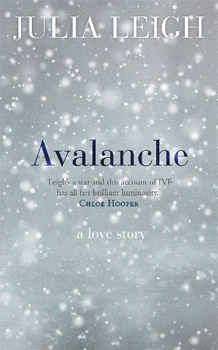Avalanche

Avalanche
-For a great many nights I injected myself with an artificial hormone produced in a line of genetically modified Chinese hamster ovary cells.'
Avalanche is a gripping, moving and shockingly honest memoir from acclaimed novelist Julia Leigh (The Hunter, Disquiet). In this book, Leigh lays bare her heartbreaking experience of IVF – a profoundly important and widespread experience – and probes the practice and promises of the lucrative IVF industry.
For many women IVF has been a blessing, filling their lives with love. But for even more women it has been a ruinous path. With poetic clarity, Avalanche tells Julia's own story in unflinching detail – her late-blooming yearning for a baby; the emotional rollercoaster of IVF treatment; what this did to her marriage and personal relationships; the increasingly desperate attempts to become pregnant; and the highs of hope and depths of disappointment.
Writing in the immediate aftermath of the decision to stop treatment, Julia offers a beautiful -shared aloneness' to anyone who has desperately longed for a child. Through the lense of a personal journey she also tells a bigger story, navigating the medical science of IVF and revealing how things really work inside the clinic.
Avalanche is an extremely important and compelling account of an issue faced and experienced by an increasing number of women every day, everywhere across the world.
A note from the author:
-A writer contemplating whether or not to begin a new work asks herself – Is this truly a story worth telling? Avalanche felt necessary. I've tried to tell an intensely personal story about a common experience that has largely remained unspoken. I hope I've brought into the light the way the IVF industry really works – and I could only do that in non-fiction. I wanted to transmit what it feels like to be on the so-called -emotional roller-coaster', to deeply honour that complex experience in all its detail. Ways of loving, why we do or don't want children, the mysteries of the body, the vagaries of science, the ethics of medicine – the material raised so many questions. I wanted to offer a -tender shared aloneness' to anyone who has desperately longed for a child and found themselves unlucky (more broadly, perhaps we can all relate to defeated dreams). I started writing it very soon after I made the decision to stop treatment because I wanted to capture my strong feelings before they were blanketed by time. I wanted to write something for all the women who are contemplating IVF, or currently undergoing it, or who have stopped or who are thinking about stopping (it's so hard – the decision to -give up'). I wanted to speak to their family and friends. I wanted to speak to young women who in a misguided way might be relying on fertility treatment as a kind of backup. And I wanted to speak to the policy-makers too. Since there is so much IVF failure I wanted to provide an alternative voice to the miracle stories we frequently see in the media. I wanted to counter the push – yes, the push – of the worldwide multi-billion dollar IVF industry.'
Julia Leigh is the author of two internationally acclaimed and widely translated novels, The Hunter (1999) and Disquiet (2008). Her film Sleeping Beauty was nominated for the Palme D'Or at the Festival de Cannes 2011. She lives in Sydney, Australia.
Avalanche
Penguin Australia
Author: Julia Leigh
RRP: $24.99
Interview with Julia Leigh
Question: What inspired you to write Avalanche?
I wanted to describe the inner-world an IVF patient.
Question: Was it difficult reliving certain experiences when writing Avalanche?
Julia Leigh: In a way, yes, because I tried to capture my strong feelings before they were blanketed by time. It was such an intense passage of life that I wanted to memorialise it in a way. I wanted to transmit what it feels like to be on the so-called -emotional roller-coaster', to deeply honour that complex experience in all its detail.
Ways of loving, the mysteries of the body, the vagaries of science, the ethics of medicine – the material raised so many questions.
Question: What did you learn about yourself during the writing process?
Julia Leigh: Strangely, I learnt it was difficult to write in the first person. I'm not so sure I even believe in a fixed self, an "I". And I also learnt that what I need to hold onto now is a hard-won commitment to loving widely in ways I would not have previously expected. I'm trying to unshackle my love from the great love I wanted to give my own child.
Question: What do you hope readers take from Avalanche?
Julia Leigh: I hope I've brought into the light the way the IVF industry really works – and I could only do that in non-fiction. I wanted to write something for all the women who are contemplating IVF, or currently undergoing it, or who have stopped or who are thinking about stopping (it's so hard – the decision to -give up'). I wanted to speak to their family and friends. I wanted to speak to young women who in a misguided way might be relying on fertility treatment as a kind of back-up. And I wanted to speak to the policy-makers too. Since there is so much IVF failure I wanted to provide an alternative voice to the miracle stories we frequently see in the media. I wanted to counter the push – yes, the push – of the worldwide multi-billion dollar IVF industry. But the main thing is – I really hope I've provided some solace for women who now find themselves in the same boat that I was once in. Sometimes there's comfort in simply "recognising" yourself in another person's story.
Question: Why was it important for you to be shockingly honest when writing Avalanche?
Interview by Brooke Hunter
MORE



